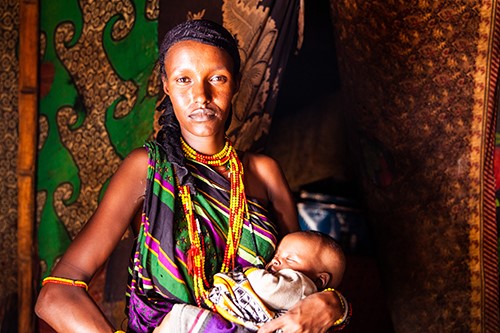The Kenyan Government has declared a national disaster following a third consecutive failed rainfall season in eastern and northern Kenya. Many communities are now experiencing critical drought conditions, with Marsabit county in northern Kenya one of the most affected regions in the country.

Food crisis in Kenya
The impact of drought and food shortages is felt more severely by those who are most vulnerable – children, mothers and the elderly. High levels of malnutrition are rampant among communities, primarily pastoralists who rely on water to raise their livestock.
The drought has also exacerbated hardship and poverty, resulting in increased school dropout rates. Women and girls in particular walk for kilometres in search of water, exposing them to further risks.
According to the World Food Programme:
Around 4.35 million people in Kenya are food-insecure and in need of humanitarian assistance.
Over 884,460 children under 5 years old are moderately or severely malnourished
Donate to help tackle the food crisis
Impact of climate change on Kenya
The livelihoods of pastoralist communities in Marsabit is highly dependent on consistent and predictable rainfall to harvest their crops and keep livestock alive. Many communities in Marsabit have reported increased severity and frequency of droughts in recent years, which have led to livestock deaths and crop failure.
Additionally, climate change has exacerbated the risks for vulnerable communities in northern Kenya, with rising temperatures, heat waves and changes in seasonal rainfall wreaking havoc across the country. The drought is threatening to reverse years of progress in poverty reduction across Kenya as the food crisis, the ongoing effects of COVID-19 and extreme weather events push the most at-risk communities further into poverty.
I live in Marsabit, I was born and brought up in Marsabit – and when we were young, about 40 years ago, drought happens but perhaps once in a decade, or maybe twice. But now, hardly two years pass before you experience a severe drought or a dry spell. Now because of the drought the vegetation is getting debilitated in some of the areas that even if it rains, hardly any vegetation grows in these areas.
Talaso’s story
Talaso is a 20-year-old mother living in northern Kenya. She and her husband lived comfortably, until the drought killed almost all the livestock they relied on to earn a living.
“When we were young, we didn’t have to stress, there were no droughts like this. We’d just take care of our livestock. Our lives were comfortable then,” Talaso said.
“The life now is so difficult. There is no food, there is no water, the livestock are no longer here. We used to have livestock and we used to sell the livestock and get food. Now everything is gone, and we have a very difficult life now.”

For the past three years, Talaso and her family have endured consecutive years of low rainfall. As a pastoralist, Talaso relies entirely on her livestock for meat, milk and income generation. But the prolonged drought currently striking Kenya, has meant that she no longer has enough livestock to sell and earn income to buy food and pay for her children’s education.
“There are many times that children, my family goes without food. As a mother, when I gave birth, I needed food, but I don't have food. I needed milk, but I don't have milk. I have a child, I have nothing to give that child. I went through a very difficult situation as a mother. I don't buy food because I don't have any cash. Other than what somebody gives me, I don't buy any food because I don't have cash.
The current food crisis also means that Talaso faces a difficult choice between her children’s immediate survival and their long-term future. Like many people in her community, Talaso is dependent on humanitarian aid to access food and clean water.
“I wish I had enough to make sure that my children are comfortable. To make sure that some of them go to school and get a good education,” Talaso said.
“It's very difficult to balance between providing food and water and paying school fees. Because getting the food and water is expensive. And you need school fees to send children school, so this is a very difficult situation.”
You can help fight hunger in Kenya
With the support of Caritas Catholic Diocese of Marsabit, mothers like Talaso can receive urgent support such as food aid and clean water.
Our partners on the ground are working to help vulnerable communities in Marsabit through:
Emergency food rations
Clean water to vulnerable communities
Education for vulnerable children
Across eastern Africa, over 81.6 million people are facing high acute food insecurity in countries such as Kenya, Ethiopia and Somalia. The Africa Food Crisis is threatening to push millions onto the brink of famine. We must act now to provide urgent food and water to communities who need it most.
Donate to help fight hunger
Where does my donation go?
The funds raised through this appeal will be used to provide immediate and longer-term humanitarian assistance to communities affected by crises in affected by the food crisis in Ethiopia, Somalia, South Sudan and Eritrea.
Where this is not possible, the funds will be used to provide immediate and longer-term development and humanitarian assistance to communities affected by crises and poverty across the world. If any excess funds remain after a crisis, or if there are changes in circumstances beyond our control that limit our ability to use the funds, they are kept in the Emergency Response Appeal so that we can respond to ongoing development needs and future crises across all our regions.